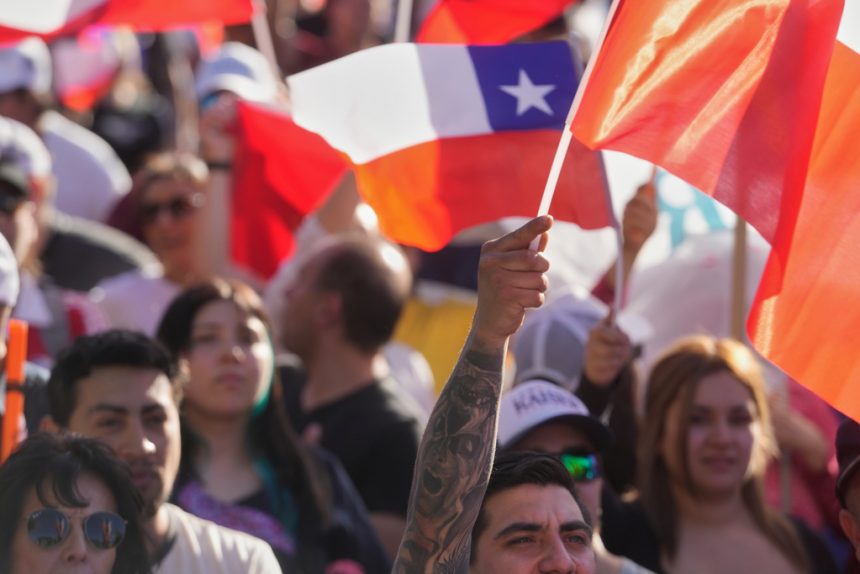When Gabriel Boric was sworn in as president of Chile in 2022, his victory was heralded by supporters as the beginning of a new era in the country’s political history.
The leftist leader, only 36 at the time, was swept into power by a wave of protests focused on cost-of-living issues.
He also promised to oversee the rewriting of the Chilean Constitution, created during the dictatorship of Augusto Pinochet and famous for locking the country into a pro-market model.
But several years later, after a series of failed efforts to replace the old constitution, Chile is on the verge of a sharp about-face. Boric is limited to one term at a time in office, and the country’s political right sees an opening to return to power, particularly as concerns rise over crime and immigration.
Sunday marks the first round of voting in Chile’s 2025 presidential race. But the race is likely to progress to a run-off, with Jeannette Jara, the nominee for Boric’s coalition, leading a packed field of conservative rivals.
That fractured right-wing base, however, is likely to consolidate into a formidable force by the second round of voting.
Who are the main candidates on Sunday’s ballot? Which issues are front and centre? And what do polls tell us about the first round of voting? We answer those questions and more in this brief explainer.
INTERACTIVE-CHILE-ELECTION-AT-A-GLANCE-NOV-2025
When is the election?
The first round of voting takes place on November 16, with 50 percent of the vote needed for a candidate to win outright.
If no candidate reaches that threshold, a second round of voting will take place on December 14.
The November 16 vote will, however, be crucial for deciding the composition of the country’s legislature, with all 155 seats in the Chamber of Deputies up for grabs, as well as 23 out of 50 seats in the Senate.
Will voting be mandatory?
Mandatory voting is returning to Chile’s presidential elections for the first time since 2012.
That means participation rates are likely to increase. During the first round of the 2021 election, for instance, only about 47 percent of eligible voters participated.
During obligatory voting in constitutional referendums, that figure has risen higher than 80 percent.
There were 15,450,377 registered voters in Chile as of 2024, according to the government’s electoral agency.
Who are the candidates?
Boric cannot seek re-election, but his governing coalition, Unity for Chile, has placed its hopes on Jeannette Jara, 51.
Unity for Chile, which is comprised of eight parties, held a primary in June that Jara handily won, sweeping 60 percent of the vote.
As a labour minister under Boric, Jara led an effort to reduce the work week from 45 hours to 40. She has campaigned on affordability, pledging to increase Chile’s minimum wage and make housing more affordable.
Her candidacy is considered historic in contemporary Chilean politics, in part because of her working-class background and in part because she represents the Communist Party, which has not seen such broad support since Chile’s return to democracy.
Jara has sought to project stable and experienced leadership on the campaign trail. She has also put forward a public safety plan that would train more police and expand the country’s prison system.

Presidential candidate Jeannette Jara of the Unity for Chile coalition speaks during a campaign rally in Santiago, Chile, on November 11 [Luis Hidalgo/AP Photo]
While the governing leftist coalition held a primary in June, parties on the centre-right and far-right declined to do so, leading to multiple candidates on November’s presidential ballot.
The frontrunner on the right is considered to be Jose Antonio Kast, a 59-year-old former congressman running on behalf of the Republican Party.
The far-right Kast previously lost to Boric in the 2021 presidential election, but this time around, he is projected to do well, particularly if he reaches the second round of voting.
There, he is likely to consolidate the support of other right-wing candidates who fail to advance to the final ballot.
During his campaign, Kast has laid out a hardline vision on issues such as crime and immigration, pointing to the strongman leader of El Salvador, Nayib Bukele, as an inspiration.
He has pledged to carry out a campaign of mass deportation, slash government spending and seek greater incentives for companies to invest in Chile.
Kast has also expressed support for the dictatorship of the late military leader Augusto Pinochet, who oversaw the torture, disappearance and killing of dissidents while in power from 1973 to 1990.

Jose Antonio Kast and his wife Maria Pia Adriasola wave to supporters at a campaign rally in Santiago, Chile, on November 11 [Esteban Felix/AP Photo]
Another candidate running on a hard-right platform is Johannes Kaiser, a 49-year-old former YouTuber and a member of the Chamber of Deputies who is running with the National Libertarian Party.
Kaiser has promised deeper pro-market reforms than Kast, as well as an end to Chile’s involvement in international agreements on climate change and human rights. He has also staked out right-wing positions on public safety, calling for the use of the death penalty and greater access to firearms.
Other candidates include Franco Parisi, a former radio host and economist running as an independent, and Evelyn Matthei, a pro-business, centre-right politician.
How do polls rank the presidential candidates?
According to polling averages from the Americas Society/Council of the Americas (AS/COA), the left-wing nominee Jeannette Jara is currently leading the race. She earns about 25 percent of voter support in most prominent polls.
Her closest rival is Jose Antonio Kast, the far-right candidate, with about 20-percent support.
Libertarian Johannes Kaiser and independent Franco Parisi have seen slight upswings in support for their campaigns. Each has between 10 and 14 percent support.
Centre-right candidate Evelyn Matthei has seen a small decline but is polling in the same range, between 11 and 14 percent.

INTERACTIVE-CHILE-POLLS-NOV-2025
What issues are front and centre?
As voters head to the polls, a handful of issues are top of mind. An October poll from the research firm Activa shows that crime and immigration dominate as areas of concern, with unemployment and health tied for third.
Chile remains a relatively safe country compared to others in Latin America, with some of the lowest rates of violent crime in the region.
But it is partly due to the expectation of lower crime that a recent surge in organised criminal activity, corruption and theft has been so disorienting for voters.
“I had to install remote surveillance cameras [and] chain the tables, and on weekends I hired a security guard to help keep watch,” Leidy Paredes, the owner of a nightclub in the capital of Santiago, told The Associated Press news service.
Chile is not the only country in South America to see an uptick in crime. Over the last several years, a surge of violence in Ecuador has likewise helped propel candidates promising “mano dura” or “strong hand” policies, although experts note that tackling crime is a multifaceted endeavour and force alone is rarely the answer.

From left, presidential candidates Franco Parisi of the Party of the People, Jeannette Jara of the Unidad por Chile coalition, Marco Enriquez-Ominami of the Progressive Party, Johannes Kaiser of the National Libertarian Party, Jose Antonio Kast of the Republican Party, Eduardo Artes of the Proletarian Action Party, Evelyn Matthei of the Chile Vamos coalition and Independent Harold Mayne-Nicholls gesture prior to a debate ahead of the November general elections, in Santiago, Chile, Monday, November 10, 2025 [Esteban Felix/AP Photo]
In Chile’s presidential race, right-wing candidates like Kast have promised an “iron-fisted approach to crime”.
While left-wing contenders like Jara have accused their rivals of scaremongering, they too have been pushed to take a harder line on crime and public safety. Jara, for instance, has promised to build more prisons.
There has also been a public backlash to immigration in the country, following a substantial increase in migrants and asylum seekers, many of them fleeing economic and political turmoil in Venezuela.
A report from two of the country’s immigration agencies found that migration to Chile increased by 46.8 percent between 2018 and 2024. From 2022 to 2024, the increase was a much lower 4.5 percent.
Around the world, immigrants are frequently targets for concerns about crime and economic stagnation, forming a convenient scapegoat for politicians. Candidates like Kast have promised a campaign of mass deportation, while Jara has proposed creating a temporary registration system to keep track of undocumented arrivals.
Chile’s economic slowdown is also playing a role in the election, with Chile’s 9 percent unemployment rate one of the highest in Latin America.









